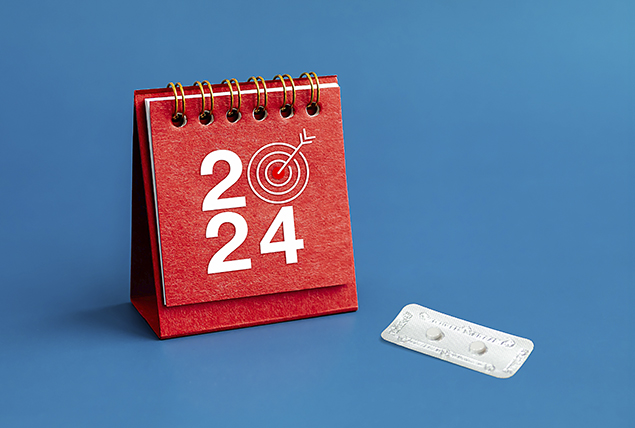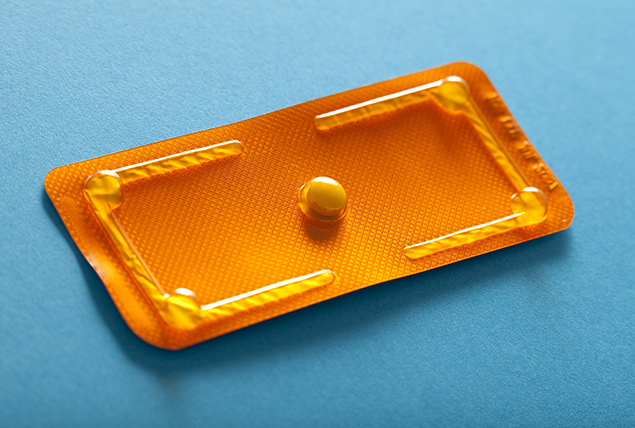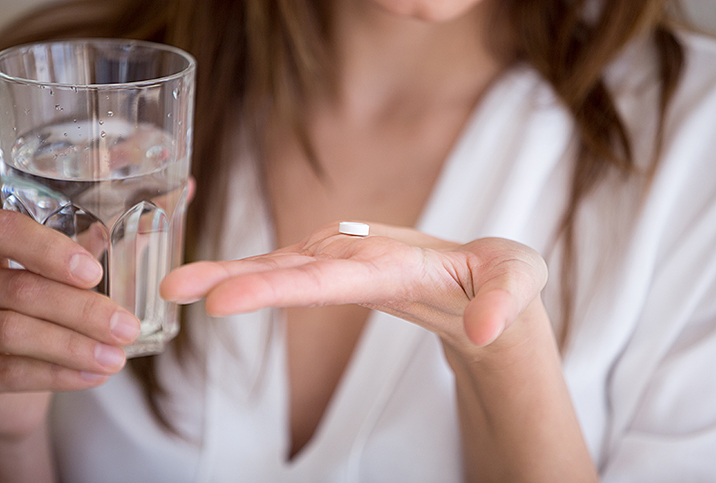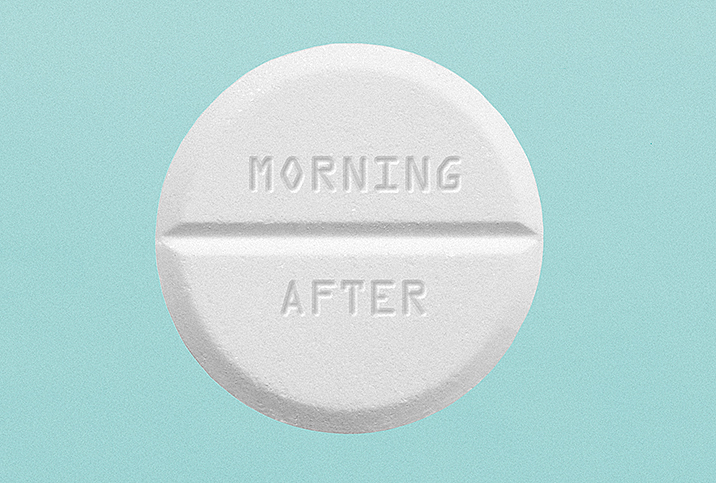Morning After Pill Sales Spike in the Week Following New Year

Key Points
- Emergency contraception can be an effective way to prevent pregnancy after unprotected vaginal intercourse.
- A new study indicates sales of products containing the hormone levonorgestrel, the most common form of emergency contraception, soar around the New Year's holiday.
- The data suggests there are unmet contraceptive care needs in the U.S.
New Year's may outshine Valentine's Day as America's sexiest holiday, according to a recent analysis of emergency contraceptive sales. For the past few years, sales of the "morning-after pill"—brand name, Plan B One-Step—have spiked in the week following New Year, a period associated with an increase in casual sex.
The findings may seem unusual, but they underline serious public health concerns, from the prevalence of sexual violence to TikTok misinforming teens about sex.
Why are emergency contraception sales rising after New Year's?
A team of researchers from Texas Tech University analyzed sales of the morning-after pill in national retail outlets from 2016 to 2022. They focused on holidays for the 2023 study published in The BMJ, a weekly peer-reviewed medical journal.
The data suggests morning-after pill sales rose most significantly the week after the New Year's holiday, with an extra 41,000 sold in 2022.
The researchers also found an increase, though much less significant, after Valentine's Day, St. Patrick's Day and Independence Day. There was no increase in morning-after pill sales around Father's Day, Mother's Day or Easter.
Based on the data, they predict sales will increase about 10 percent this year.
The researchers acknowledge the study's limitations, including the fact that the number of pills sold doesn't necessarily equal the amount of unprotected vaginal intercourse people have and that the data doesn't include pills acquired from online sources or medical clinics.
The study authors do believe their findings indicate the need for broader access to contraceptive care and better prevention strategies to reduce sexual violence.
The higher likelihood of unprotected sex around holidays is partly attributable to an increased consumption of alcohol or drugs, the study data indicated. New Year's is also associated with a rise in sexual assault.
People may have trouble accessing other forms of birth control because clinics, doctor's offices, pharmacies and stores have limited hours or are closed on New Year's Eve and New Year's Day.
The 2022 Dobbs v. Jackson Women's Health Organization decision by the United States Supreme Court, which overturned Roe v. Wade and removed the federal right to abortion, has also driven an increase in contraceptive sales, including long-acting and emergency options.
At the same time, birth control myths are pervasive in the U.S. and elsewhere and may impact people's willingness to use more effective longer-term methods, such as hormonal birth control pills, patches, rings or IUDs.
"More than ever, emergency contraception is a critically important option for people in the U.S., particularly those living in regions with bans or severe restrictions on abortion," the study authors wrote. "Future work will explore how other dynamics at play in the U.S. context, including state abortion restrictions, affect emergency contraception purchasing behavior and imply potential public health interventions to provide contraceptive care to those who need it the most."
Recommended
- STDs Have No Age Limit: The number of seniors contracting sexually transmitted diseases is on the rise in the U.S.
- Selecting the Birth Control That's Right for You: When it comes to birth control, choose the type of contraception that's best suited to your lifestyle.
- Talking to Your Teen About Birth Control: Having 'the talk' with your teenager doesn't have to be awkward.
How can sexually active people stay safe during the holiday season?
There's no harm in getting frisky to ring in the new year, provided you take some precautions.
Besides the risk of pregnancy, casual sex puts you at a higher risk of getting a sexually transmitted infection (STI), so it's essential to use condoms and other barrier methods of contraception. And if you're in a high-risk group, use pre-exposure prophylaxis for HIV prevention, according to the New York City Health Department.
Plan before New Year's Eve to minimize the risk of being empty-handed when you need protection most.
Also, keep tabs on your drinking—and never leave a drink unattended—per the agency. Moreover, mind how alcohol may interact with certain medications, and avoid mixing drinks with drugs, as certain combinations could put your health and safety at risk.
Finally, although condoms are effective in preventing STIs, they're not the best method of pregnancy prevention, especially when the folks using them may be temporarily impaired. A wise strategy is to consider using a second form of birth control.
Emergency contraception
Morning-after pills use hormones to delay ovulation and thicken cervical mucus to prevent sperm from reaching an egg. Its effectiveness varies by type and how quickly you use it after having unprotected sexual intercourse—but all work best when taken within 24 hours.
The most common form, containing the hormone levonorgestrel, is a pill. It is typically available without a prescription at various brick-and-mortar and online retailers and through organizations such as local health departments and community health clinics.
Levonorgestrel is a form of progestin, one of the primary hormones found in standard birth control pills. However, the morning-after pill contains a much higher dose of the hormone.
The day after you take the morning-after pill, the most common symptoms you can expect are a mild headache or nausea. Some women also experience dizziness, stomach pain, fatigue and breast tenderness.
Levonorgestrel pills can disrupt your menstrual cycle for up to a month afterward, making it irregular or lighter or heavier than usual. Taking Plan B too often could make it challenging to track your cycle and detect illness or pregnancy, so providers don't recommend using it as your primary method of birth control.
Birth control
Longer-term hormonal contraceptives, such as a birth control patch, ring, shot or pill, may contain progestin and estrogen, or progestin alone. Like emergency contraception, they prevent ovulation and thicken the cervical mucus, according to Cleveland Clinic. They also diminish the uterine lining, so implanting a fertilized egg is more challenging.
When used correctly, these options can be more than 99 percent effective.
There are nonhormonal strategies, the most reliable being the copper intrauterine device (IUD), according to Planned Parenthood. Like long-term hormonal contraceptives, the copper IUD is about 99 percent effective. Another option, the diaphragm, is between 92 percent and 96 percent effective at preventing pregnancy.
Similar to condoms, a diaphragm must be correctly physically located before sex to be effective.
Other methods, such as contraceptive gel, spermicide, sponges and fertility awareness, are less reliable, according to Cornell University.
Tubal ligation, or having your "tubes tied," is a permanent option for people who can become pregnant.
All contraceptive methods have benefits and drawbacks. A healthcare professional can help you select the right birth control based on your needs and preferences.
What Are the Best Sex Positions for Men With ED?: Certain sex positions work better than others for guys dealing with erectile dysfunction.
What are your options if you've already had unprotected sex?
Emergency contraception doesn't induce abortions or otherwise affect existing pregnancies, so it is legally available nationwide, even in states with abortion bans.
Despite the name, you can take emergency contraceptives within five days of having unprotected sexual intercourse, but it becomes less effective the longer you wait, according to Planned Parenthood.
When taken within 72 hours of sex, levonorgestrel can reduce the chance of unplanned pregnancy by 75 percent to 89 percent.
Ella is another brand of morning-after pill based on the hormone ulipristal acetate. It is reportedly more effective than other brands but requires a prescription from a doctor. This medication can reduce the risk of pregnancy by 85 percent when taken within five days of unprotected vaginal intercourse.
A third option, the copper IUD emergency contraception method, is more than 99 percent effective when inserted within five days of vaginal intercourse, according to a Cochrane review.
The copper IUD works by inhibiting sperm's movement, preventing them from reaching an egg, according to Planned Parenthood. An IUD can work as a short-term method of contraception but equally can stay in place for up to 10 years without affecting future fertility, according to Cornell University.
If you weigh between 165 and 195 pounds, your doctor may recommend Ella, since there's some evidence that levonorgestrel may not work as well for people in this weight bracket. Other research indicates that neither form of morning-after pill is effective for people who weigh more than 195 pounds.
Healthcare providers suggest taking a pregnancy test if your period is more than a week late after using emergency contraception.
The bottom line
However you celebrate, make safety a priority. If you're sexually active, using condoms and a reliable second birth control method—such as the ring, patch, pill or IUD—is the best way to prevent pregnancy and STIs.
However, emergency contraceptives are highly effective when taken correctly.
If you're a parent, it's worth talking about sex with your teenager. Help empower your teen to make informed decisions about their health during the holidays—and beyond.


















